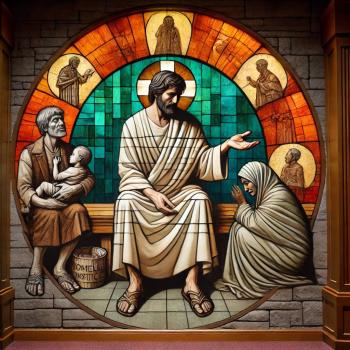Tribulation Force, pp. 423-425
A key thing to remember about the post-Rapture world of this book is that all the good people are gone. Apart from a handful of characters we know by name, everyone else on Earth is a sinful fool who obstinately rejects God in the face of overwhelming evidence.
This is important to keep in mind as we read the final chapter of Tribulation Force, because unless we accept and embrace that premise, the events about to occur will seem absurd and cruel.
The chapter begins with a description of America’s glib surrender of democratic self-government. This is reported without much detail as an unremarkable occurrence that the authors don’t see any need to explain. How could such a thing happen? How could tens of millions of Americans so casually agree to such a drastic step? The authors just assume that no such explanation is needed because, after the Rapture, all the real, true Christians have departed and thus the only Americans left are freedom-hating libertines, reprobates who despise godandamerica.
This is also why neither the authors nor their protagonists can be bothered to mourn any of the thousands slain in the nuclear strikes on American suburbs at the end of the chapter. They mourn for Bruce Barnes, but only for Bruce Barnes and not for any of the other countless victims. That seems heartlessly cold until we remember that, according to the logic of these books, none of those victims are good people or worthy people. They’re just the America-hating sinners whom God chose to leave behind. If God isn’t going to mourn their deaths, then why should Rayford and Buck mourn them?
This unregenerate unworthiness of the left-behind masses is a necessary premise going forward in this series as the body count begins to escalate. Readers can’t be expected to enjoy all this carnage if they allow themselves to think of the millions of people being slaughtered by God and/or Nicolae Carpathia as actual people.
But note the message implied by this and what it teaches readers of these books about their world — the pre-Rapture real world we actually live in. This world, the authors suggest, is occupied by two kinds of people: Real, true Christians, and evil sinners whose lives and deaths do not matter.
That’s a Hell of a lesson.
Something big was brewing. In a clandestine meeting, Buck went to see American President Gerald Fitzhugh. The president had become a tragic figure, reduced to a mere token. After serving his country for most of two terms in office, he now was relegated to a suite in the Executive Office Building and had lost most of the trappings from his previous role.
This preoccupation with “the trappings” of the presidency is just odd. Like the authors’ earlier, chapters-long obsession with Air Force One as seemingly more than a symbol, the attitude here seems more in keeping with some older, monarchical notion of government legitimacy — some system in which crowns and thrones confer power as much as they represent it.
The sense one gets from this description of the former president is that tragedy has befallen him, but not the country and not the people. The authors seem to view Fitzhugh’s ceremonial diminishment as the most significant consequence of this lawless dismissal of Article II of the U.S. Constitution. They’re far more interested in the “trappings” of the office — Air Force One, the Oval Office — than in the office itself. Weird.
Now his Secret Service protection consisted of three men rotating every 24 hours, and they were financed by the Global Community.
First, the Secret Service was part of the Treasury department and thus part of the now-defunct executive branch. So these Secret Service agents can’t actually be Secret Service agents. Jerry Jenkins doesn’t tell us here whether or not they’re armed. They shouldn’t be — he’s already told us that Nicolae’s “global disarmament” scheme has gotten rid of 90 percent of the world’s weapons, with the rest shipped off to New Babylon. Yet we keep coming across armed policemen and “Secret Service” agents.
I also have to wonder how “the Global Community” can afford to “finance” these agents. Is it now levying global taxes?
Buck met with Fitzhugh shortly after he proposed to Chloe, two weeks before the scheduled wedding. The president groused that his bodyguards were really there to make sure Carpathia knew his every move. But the most shattering thing, in Fitzhugh’s mind, was that the U.S. public had so easily accepted the president’s demotion. Everyone was enamored of Nicolae Carpathia, and no one else mattered.
Again, there’s no sense that the office of the presidency is or ought to be anything other than a personality cult. The authors don’t seem to understand that the presidency is an institution bound by laws. Fitzhugh’s “demotion” is not “shattering” because he used to be popular, but because it is massively illegal. The Constitution has not been amended or repealed, it is simply being ignored and no one — not Fitzhugh, or Buck, or the authors, finds that worth remarking on.
Fitzhugh’s demotion pales in comparison to the fact that he was not replaced, as legally required, by the vice president, but by a foreign-born, foreign national — a man who is not only not a U.S. citizen, but actually the head of a foreign state. That this brazen violation of the Presidential Succession Act was not immediately challenged in and overturned by the courts can only mean that the judicial branch must also have been swept aside.
Fitzhugh’s personal tragedy is a teensy footnote in that larger context. What we’re being told here is that every American voter enthusiastically agrees to be disenfranchised and to be subject to a new, international scheme of taxation without representation. Nicolae is able to convince people to accept such an astonishingly unpopular change because he’s really popular. That isn’t how popularity actually works.
None of this makes any sense at all or seems even remotely plausible unless we accept the authors’ decree that everyone still around post-Rapture is stupid, evil, worthless and unpatriotic. Forget patriotic — these people can’t even manage to be nationalistic.
The scenario implied here is unimaginable and unbelievable. In a world populated by real people, such a thing could never, ever happen. Once again, unwittingly, Jerry Jenkins has succeeded in illustrating the impossibility and absurdity of Tim LaHaye’s “Bible prophecies.”
Fitzhugh pulled Buck into a secure room and left his Secret Service agent out of earshot. The worm was about to turn, Fitzhugh told Buck. At least two other heads of state believed it was time to throw off the shackles of the Global Community.
Wait, shouldn’t that be “two other former heads of state”? Or, come to think of it, “two other former heads of former states”?
“I’m risking my life telling this to an employee of Carpathia,” Fitzhugh said.
That’s true. It’s incredibly dangerous for him to be talking about this to anyone, let alone someone from Nicolae’s inner circle. But Fitzhugh decides it’s worth the risk to tell Buck because … ummmm … because …
I got nothing. I can think of many, many reasons why Fitzhugh should not be telling Buck about this, but I cannot imagine a single reason why he would want or need to do so.
Buck is one of Nicolae’s few close associates. Nicolae has had two people killed just for Buck’s sake (Todd-Cothran and that rival reporter who had the “ferry accident”). Nicolae’s closest aide, Steve Plank, is Buck’s best friend. Nicolae’s biggest admirer, Chaim Rosenzweig, is like family to Buck. And Buck introduced Nicolae to his girlfriend.
But here is former President Fitzhugh, planning his secret counterrevolution and for no apparent reason he decides to summon a reporter and a close associate of the Antichrist just to tell him all about the secret plot. If this guy had been president in 1944, D-Day would never have worked.
The goal of the counter-revolution, apparently, is to win back the affection of the American people by destroying several American cities.
Fitzhugh confided to Buck that Egypt, England and patriotic militia forces in the U.S. were determined to take action “before it was too late.”
“What does that mean?” Buck asked.
“It means soon,” Fitzhugh said. “It means stay out of the major East Coast cities.”
“New York?” Buck said, and Fitzhugh nodded. “Washington?”
“Especially Washington.”
“That’s not going to be easy,” Buck said. “My wife and I are going to be living in New York when we’re married.”
“Not for long you’re not.”
“Can you give me an idea of timing?”
“That I cannot do,” Fitzhugh said.
Fitzhugh seems like the kind of guy who would use the first eight digits of his Social Security Number as his online username. Just the first eight digits, not the ninth — “that I cannot do … for security reasons.”
Buck desperately wanted to tell Fitzhugh that he was merely playing into Carpathia’s hands. This was all part of the foretold future. The uprising against Antichrist would be crushed and would initiate World War III, from which would come worldwide famine, plagues and the death of a quarter of the earth’s population.
Once again Buck “desperately” wants to tell someone the news that could save his life. But he doesn’t. He doesn’t warn Fitzhugh, or try to talk him out of it. Nor does he think of warning anyone else to “stay out of the major East Coast cities.”
Everyone in New York is doomed — all those colleagues Buck worked with for years, everyone he’s hired to work for him over the last year and a half at Global Community Weekly’s New York office. Buck knows what’s coming, but he won’t warn them. This is “all part of the foretold future” and cannot be changed or challenged or questioned.
Everyone Buck has ever known or met or loved in that great city is about to be slaughtered, but Buck accepts this because, after all, it’s God’s will.
















